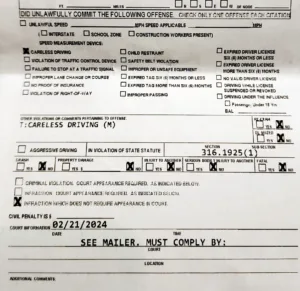Below are just a few of our happy ticket clients who think we are the BEST!
In situations where the police officer finds the driver was not paying attention or due care while driving, a careless driving ticket can be issued. Careless driving is not like speeding that you can measure. Instead, a Careless Driving Ticket relies on the sole judgment of the police officer. Any person who drives a vehicle carelessly without considering other persons or vehicles on the road, will be charged with a careless driving ticket. The way the officer interprets the violation is key to determining if you get a ticket for careless driving. So, where to begin? Let’s look at the Florida Statue, 316.1925 which is the Careless Driving Statute.
A Guide to Florida’s Careless Driving Statute, 316.1925: Navigating the Road Less Reckless
Florida’s sunshine and sprawling coastlines draw millions of visitors and residents alike, transforming its roads into a vibrant tapestry of motion. However, amidst this kinetic energy lurks the ever-present risk of careless driving, a threat addressed by the state’s Careless Driving Statute, 316.1925. This comprehensive guide delves into the intricacies of this statute, equipping drivers with the knowledge to navigate Florida’s roadways with prudence and safety.
Understanding the Core: Defining Careless Driving
At its heart, 316.1925 prohibits any person from operating a motor vehicle “without due care” and in a manner “prejudicial to the safety of persons or property.” This seemingly straightforward definition, however, encompasses a broad spectrum of behaviors. To grasp the statute’s full scope, let’s dissect its key elements:
- Without due care: This implies a failure to exercise the caution and attentiveness a reasonable driver would under similar circumstances. Examples include speeding, texting while driving, and failing to yield the right of way.
- Prejudicial to the safety of persons or property: This element emphasizes the potential consequences of careless driving. Any action that poses an unreasonable risk of harm to individuals or their belongings falls under the statute’s purview.
Beyond the Basics: Exploring Specific Examples
 While the core definition provides a solid foundation, understanding 316.1925 demands delving into specific scenarios. Here are some common examples of behaviors deemed careless driving in Florida:
While the core definition provides a solid foundation, understanding 316.1925 demands delving into specific scenarios. Here are some common examples of behaviors deemed careless driving in Florida:
- Speeding: Exceeding the posted speed limit, regardless of the amount, constitutes careless driving. This includes exceeding the “safe speed” even when the posted limit is not being broken.
- Distracted Driving: Engaging in activities that divert attention from the road, such as texting, talking on the phone without a hands-free device, or adjusting the radio, falls under this category.
- Following Too Closely: Tailgating, or maintaining an unsafe distance between vehicles, significantly increases the risk of rear-end collisions and is considered careless driving.
- Improper Lane Changes: Recklessly weaving through traffic, failing to signal lane changes, or making sudden turns without due regard for other drivers are all prohibited under the statute.
- Driving Under the Influence (DUI): Operating a vehicle with a blood alcohol content (BAC) of 0.08 or higher, or while impaired by any drug or other substance, is a serious offense and a clear violation of 316.1925.
Navigating the Consequences: Understanding Penalties and Potential Impacts
A careless driving conviction carries significant consequences, ranging from fines and points on one’s driver’s license to potential suspension or even revocation. In addition to these legal repercussions, a careless driving incident can have far-reaching personal and financial impacts. Medical bills, property damage, and even lawsuits arising from accidents caused by careless driving can have a devastating effect on individuals and families.
Staying on the Right Path: Tips for Safe and Responsible Driving
Preventing careless driving incidents requires a proactive approach. Here are some key tips for navigating Florida’s roads with safety and responsibility in mind:
- Practice defensive driving: Be aware of your surroundings, anticipate the actions of other drivers, and avoid risky maneuvers.
- Obey all traffic laws: Speed limits, traffic signals, and stop signs are in place for a reason. Following them is paramount to safety.
- Minimize distractions: Put your phone away, avoid eating or applying makeup while driving, and focus solely on the road.
- Maintain your vehicle: Ensure your car is in good working order, with properly inflated tires, functioning brakes, and clear headlights and taillights.
- Plan ahead and avoid fatigue: Allow ample travel time to avoid rushing, and do not drive when tired or drowsy.
A Shared Responsibility for a Safer Florida
Florida’s Careless Driving Statute, 316.1925, plays a crucial role in promoting safe and responsible driving practices across the state. By understanding its provisions, recognizing the potential consequences of careless actions, and actively implementing safe driving habits, we can all contribute to a more secure and enjoyable experience for ourselves and our fellow travelers. Remember, the key to navigating Florida’s roads lies not just in knowing the rules, but in embracing a mindset of care, awareness, and shared responsibility. Let’s choose to share the sunshine state’s vibrant roadways with courtesy and caution, ensuring that every journey unfolds with the promise of safety and a happy destination.
Receiving a Careless Driving Ticket in Florida?
 Florida’s vibrant roads buzz with life, but amidst the sunshine and palm trees lurks the potential for careless driving incidents. If you find yourself on the receiving end of a careless driving ticket under Florida Statute 316.1925, don’t panic. This guide will equip you with the knowledge and steps to navigate this situation effectively, minimizing the impact on your driving record and finances.
Florida’s vibrant roads buzz with life, but amidst the sunshine and palm trees lurks the potential for careless driving incidents. If you find yourself on the receiving end of a careless driving ticket under Florida Statute 316.1925, don’t panic. This guide will equip you with the knowledge and steps to navigate this situation effectively, minimizing the impact on your driving record and finances.
Understanding the Offense
- What is Careless Driving? 316.1925 defines careless driving as operating a vehicle “without due care” and in a manner “prejudicial to the safety of persons or property.” This encompasses a wide range of behaviors, including speeding, distracted driving, unsafe lane changes, and following too closely.
- Severity and Penalties: Careless driving is a moving violation and carries significant consequences. Fines can range from $164 to $500, depending on the severity of the offense. Additionally, points are assessed on your driving record, potentially leading to license suspension or revocation if enough points accumulate.
Immediate Actions
- Safety First: Ensure everyone involved in the incident is safe. If there are injuries or property damage, call emergency services immediately.
- Review the Ticket: Carefully read the ticket for details like the specific offense you’re cited for, the date and location of the incident, and the court appearance date.
- Gather Evidence: If possible, document the incident with photos or videos of the scene, weather conditions, and any damage sustained. Witness statements can also be valuable.
- Contact Your Insurance Company: Inform your insurance company about the ticket as soon as possible. They may be able to assist with legal representation or offer advice.
Exploring Your Options
- Paying the Ticket: If you admit full responsibility for the offense and want to avoid the hassle of court proceedings, you can simply pay the fine by the due date. This option results in points being added to your license.
- Traffic School: In some cases, attending a state-approved traffic school course can help you reduce the number of points assessed on your license. This option may also lead to a reduced fine.
- Fighting the Ticket: If you believe the ticket was issued in error or have strong evidence to contest the accusation, you can choose to fight the ticket in court. This option requires legal representation and involves presenting your case to a judge.
Seeking Legal Counsel
- Consultation: Consider consulting with a traffic ticket attorney, especially if you’re unfamiliar with the court system or intend to fight the ticket. They can advise you on the best course of action and represent you in court.
- Representation: If you decide to fight the ticket in court, having an attorney represent you can significantly increase your chances of success. They can navigate the legal proceedings, present your case effectively, and negotiate potential plea bargains.
Additional Considerations
- Driver’s License Impact: Remember, careless driving points stay on your license for a period of time, potentially affecting your insurance rates and future driving privileges.
- Driving Record Consequences: A careless driving conviction can impact your eligibility for certain jobs or professional licenses.
- Future Driving Habits: This incident should serve as a wake-up call to prioritize safe and responsible driving practices in the future.
Receiving a careless driving ticket can be stressful but understanding your options and taking proactive steps can minimize the impact on your life. By carefully reviewing the offense, exploring your options, and seeking legal counsel if necessary, you can navigate this situation effectively and ensure you’re driving future remains on the right track. Remember, safe driving is not just a legal obligation but a shared responsibility for everyone on the road.


